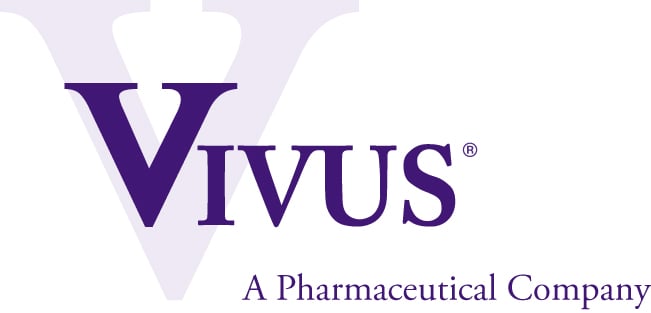After the closing bell on Monday, VIVUS (VVUS +0.00%) shares entered unchartered territory following the release of its first-quarter earnings report -- and by unchartered I mean actually up.
VIVUS hasn't had the best of luck come earnings time. In fact, its track record is downright awful. With the exception of the two most recent quarters, the company had reported a wider than expected loss in eight straight quarters. Furthermore, Wall Street estimates project VIVUS will continue to lose money through 2016, suggesting a predictably wild ride come each earnings season.

Source: VIVUS.
Last night, however, VIVUS delighted shareholders with a big beat. Revenue for the quarter surged nearly 800% to $36.7 million, from $4.1 million in the prior-year period. Meanwhile, net loss shrank demonstrably to just $15.6 million, or $0.15 per share, from $53.6 million, or $0.53 per share, in the year-ago quarter. Wall Street had anticipated a loss of $0.37 per share on just $11.4 million in revenue. So this was a sizable beat.
A big beat, but for all the wrong reasons
But dig a bit deeper and I suspect the luster associated with this earnings beat will be lost very quickly.
Aiding VIVUS' top line for the quarter was $19.4 million in license and milestone revenue, $7.4 million in supply revenue, and $0.8 million in royalty revenue tied to its commercial agreements for erectile dysfunction drugs Stendra and Spedra.
However, buried within its report was more mixed data tied to disappointing weight control management drug Qsymia. Product revenue more than doubled to $9.1 million from $4.1 million in the prior-year period, but -- and this is a huge but -- prescriptions written actually fell from the sequential fourth quarter, from 124,000 to 121,000.
Source: VIVUS quarterly filings.
According to VIVUS CEO Seth Fischer:
We continue to make progress in educating providers, payors, and patients that the disease of obesity required proactive treatment with a safe and effective agent that is clinically proven to deliver meaningful weight loss. We believe in the long-term prospects for this market as we efficiently deploy our resources to make Qsymia the drug of choice for patients that are obese or overweight with weight-related medical conditions.
Long story short, VIVUS and its CEO continue to feel they have a long-term winner in Qsymia. The company also announced the addition of actress Shari Belafonte to its marketing campaign to spread awareness about proactive obesity treatments.
I think VIVUS couldn't be skirting further from reality. Qsymia is thus far a monumental failure.
Consider for a moment that initial Wall Street estimates pegged Qsymia's peak sales potential at north of $1 billion annually. In six quarters of having Qsymia available for commercial sale VIVUS has tallied just $34.8 million in cumulative sales. That paltry product revenue is hardly enough to keep the lights on.
Qsymia's quad-fecta of potential problems
I suspect there are a number of factors at play here that are collectively holding back Qsymia's full potential.
First, in clinical trials Qsymia outperformed rival Arena Pharmaceuticals' drug (ARNA +0.00%) in terms of overall weight loss, but sank behind Arena's now-FDA approved weight control management therapy Belviq for safety. Physicians simply don't fool around when it comes to safety, and it seems they will usually opt for more modest weight-loss results if it means a safer dosing profile.
Second, drugmakers are having one heck of a time convincing insurers to jump on board when it comes to weight control management products. Even though both Qsymia and Belviq aren't particularly pricey, shortly after Qsymia was introduced to market in 2012 it had a prescription pickup failure rate of close to 30% at pharmacies because consumers weren't willing to purchase the medication using out-of-pocket cash. While I'm confident insurance coverage of Qsymia is improving, it's pretty evident that it's not improving quickly enough.
Third, unlike its two primary rivals, VIVUS has no marketing partner. Arena is partnered with Eisai Pharmaceuticals, while Orexigen Therapeutics (NASDAQ: OREX), which has lead drug Contrave under review by the Food and Drug Administration, is collaborating with Takeda Pharmaceuticals. These partners may take their fair share of revenue, but they also share in costs and have plenty of global marketing experience. VIVUS' sales team doesn't have that similar experience to lean on.
Finally, physicians might be holding off on prescribing Qsymia until the FDA's decision on Orexigen's Contrave by or before June 10. The move would make a lot of sense given that Orexigen's Light Study -- a 9,800-person cardiovascular outcomes study that demonstrated Contrave didn't increase adverse cardiac events -- could give it a safety profile edge over either of its peers. With this long-term study now in the books, Orexigen could land the lion's share of prescriptions in the U.S., to Qsymia's detriment.
What now for VIVUS?
For now it looks as if VIVUS will have to fall back on erectile dysfunction drugs Stendra and Spedra while Qsymia sales muddle along. For investors this means the expectation of more losses, more cash burn, and erratic quarter-to-quarter milestone revenue. In other words, if you've been sticking to the sidelines that's probably the safest place to remain, at least for the immediate future.


